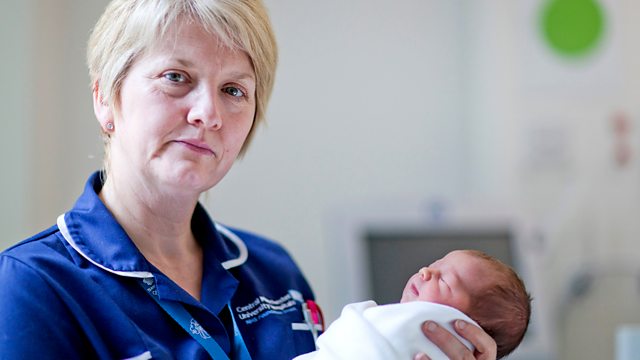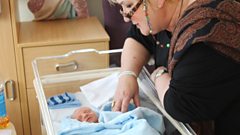Midwives Special - live from the Liverpool Women's Hospital
Jenni Murray presents a midwives special, live from the Liverpool Women's Hospital, looking at vacancies and recruitment and what being a midwife in the modern NHS really involves.
A midwives special - live from the Liverpool Women's Hospital presented by Jenni Murray.
We'll be unveiling the findings of a Freedom of Information request submitted to NHS Trusts in England which looked at vacancy rates for midwives, and get reaction from the health minister and the Royal College of Midwives. We'll discuss the impact of these figures on staff moral, recruitment and the number of people leaving the profession. We'll talk to midwives about what their job actually involves, what patients now expect from them and the pressures they face delivering a first class service for all women no matter what their needs. Plus what do mum's think about maternity services - what are their priorities? And what might maternity care in the future look like?
Presented by Jenni Murray.
Producer Karen Dalziel.
Last on
Clips
Midwife shortages
Woman’s
Hour has been investigating midwife shortages in England. 99 NHS trusts in
England responded to our
Freedom of Information request where we asked about qualified midwife vacancy
levels and about how their workforce needs have been assessed. We found
that nearly a quarter of NHS Trusts in England have not assessed their workforce
needs in the past four years. This
FOI also found that that 80% of the trusts have vacancies for qualified
midwives. Midwife
shortages have been an ongoing problem with the Department of Health
acknowledging that 2,300 more midwives are needed. The Royal College of
Midwives puts the figure at 4,800.
Jenni is live at Liverpool Women’s
Hospital to discuss the problem of midwife shortages with their head of midwifery, Cathy Atherton, Cathy Warwick - chief executive of the Royal College
of Midwives, and Dan Poulter, health minister with responsibility for maternity
services.
What do midwives do?
Parents' view of maternity care
We speak to some new mums and dads at the Liverpool Women’s Hospital about their priorities for maternity care. The NHS has to make tough decisions on how its limited resources are allocated, so what aspects of care are crucial and what might be considered a luxury? From access to epidurals and birthing pools to help with bathing and feeding, Jenni finds out what makes a difference and what might ruin a mum’s experience of pregnancy and birth.
Maternity in the future
The role of midwives has changed over past twenty years. How much might it change in the next twenty, when the babies born today have their own children? How will the midwives role and workload change as a result of technological and scientific advances?
Credits
| Role | Contributor |
|---|---|
| Presenter | Jenni Murray |
| Producer | Karen Dalziel |
Broadcast
- Thu 24 Apr 2014 10:00BBC Radio 4
Podcast
-
![]()
Woman's Hour
Women's voices and women's lives - topical conversations to inform, challenge and inspire.





